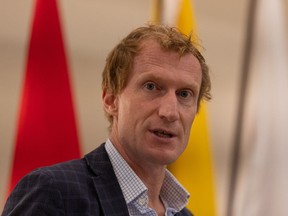UPDATE: Feds cap international students prompting N.B. backlash
A total of 360,000 new international student permits will be issued in 2024, a reduction of 35 per cent from last year’s numbers

Article content
OTTAWA • The Trudeau government is dramatically reducing the number of international student permits it issues, a move that will force New Brunswick to scale back by thousands the number of students from abroad it accepts.
It’s a move the feds say is necessary, maintaining that institutions are increasingly taking advantage of newcomers through high international student tuition, while putting further strain on the country’s housing crisis in the process.
But it’s facing immediate backlash from the Higgs government, suggesting the consequences of limiting student growth will be much more far reaching.
“These changes have the potential to hurt New Brunswick by wiping out recent enrollment growth at our colleges and universities, shrinking the labour market, and reducing the number of provincial immigration nominations,” Post-secondary Education, Training and Labour Minister Arlene Dunn said in a statement.
She added that the provincial government is not in favour of the move “that unfairly targets all provincial jurisdictions when not all are experiencing the same problems.”
A total of 360,000 new international student permits will be issued in 2024, a reduction of 35 per cent from last year’s total numbers across the country as part of a two-year temporary cap, Immigration Minister Marc Miller announced on Monday.
Those 360,000 permits will be distributed to provinces on a per capita basis.
Miller acknowledged that the cap means a permit reduction of 50 per cent in Ontario, while adding that New Brunswick is also among the provinces facing the largest impact.
“I gave you the numbers, get out your calculator, look at the population of each province, and you will be able to see where the problem exists at this time,” Miller said. “Nova Scotia, New Brunswick, Ontario, and British Columbia, they’re the most affected.”
New Brunswick has roughly 2.1 per cent of the country’s population, meaning about 7,560 permits will be allocated to New Brunswick.
That’s as federal data shows the province welcomed 11,410 international students in 2022.
That points to a reduction of nearly 4,000 students, or roughly a third.
Brunswick News has asked the feds to confirm those figures.
Miller said on Monday that the “integrity” of the international student system has increasingly been threatened, suggesting some “bad actors” have significantly increased student numbers solely to drive revenues, without the actual resources to offer a quality education.
“It’s unacceptable that some private institutions have taken advantage of international students by operating under-resourced campuses, lacking supports for students and charging high tuition fees all the while significantly increasing their intake of international students,” Miller said.
He later added that rapid increases in the number of international students arriving in Canada also puts pressure on housing, health care and other services.
New Brunswick Social Development Minister Jill Green told Brunswick News last week that the housing crisis in the province was being fueled, in part, by an increase in international students.
“It definitely is a key component,” Green said.
But Green wasn’t calling for a cap, acknowledging the province’s post-secondary institutions need international recruits to keep growing.
“There’s pressure on our educational institutions too to grow,” she said.
“They have talked to us about their concerns.”
She added: “I think what we need to do is plan for success and just keep everything rolling as fast as we can.”
In a statement on Monday, Post-secondary Education Minister Dunn rejected the suggestion that New Brunswick has welcomed too many international students too quickly.
“The problems the federal government are trying to address with these changes are not our issues and New Brunswick is paying the price for the problems that exist in other parts of the country,” Dunn said.
“International students are critical to growing New Brunswick’s population and economy, and increasing the enrolment of our post-secondary institutions.
“New Brunswick has benefited from an increase in the number of international students in recent years, which has significantly contributed to reversing a trend of a shrinking student population.”
Dunn continued that the province is “working closely” with its post-secondary institutions “to ensure all students are able to find accommodations and our institutions are adjusting their intake in consideration of supply and demand.”
University of New Brunswick president Paul Mazerolle said in an email on Monday that the institution is “committed to recruiting international students in a responsible and sustainable way,” while maintaining that further details of the changes are needed.
The cap is likely to mean a massive financial blow for post-secondary institutions.
A year’s tuition toward a general Arts degree at University of New Brunswick costs $8,177 for domestic students. That figure is $19,148 for international students, according to the university’s website.
Meanwhile, tuition toward an Engineering degree is $11,327 for domestic students, but $22,297 for international students. UNB revenue from tuition has climbed to $110 million last year, from $101 million the year before, and $93 million two years ago.
Universities Canada said in a statement on Monday that it’s worried the cap “is going to add stress on an already stressed system.”
The feds say it’s up to each provincial government to distribute its allocated number of international student permits among their designated learning institutions.
It means the Higgs government will be tasked with prioritizing who gets what, with the feds stating that every permit application it now receives will also require an attestation letter from a province.
There are some exceptions to the new limits.
The details of the announcement state that the cap doesn’t impact study permit renewals.
Those pursuing master’s and doctoral degrees, and elementary and secondary education are also not included in the cap.
Current study permit holders will not be affected.
A cap number of 2025 has yet to be set.
In a statement, Université de Moncton spokesperson Paul Ward said it’s unclear what it means for its three campuses that welcomed a record 1,874 full-time students from abroad this year.
It was a number that’s up by 332 year over year.
“We’ve just heard the news, and we want to take the time to study what it means for the Université de Moncton, in concrete terms,” Ward said. “We’ll be asking for clarification today.
“The exception for graduate studies and certain programs are examples of how complex this issue can be, and of the need to carefully study the variables before making a decision.”
Meanwhile, Miller also announced changes to the post-graduation work permit program.
Beginning later this year, open work permits will only be available to spouses of international students in master’s and doctoral programs. The spouses of international students in other levels of study, including undergraduate and college programs, will no longer be eligible.
That’s as graduates of master’s and other “short graduate-level programs” will soon be able to apply for a three-year work permit.












Postmedia is committed to maintaining a lively but civil forum for discussion. Please keep comments relevant and respectful. Comments may take up to an hour to appear on the site. You will receive an email if there is a reply to your comment, an update to a thread you follow or if a user you follow comments. Visit our Community Guidelines for more information.